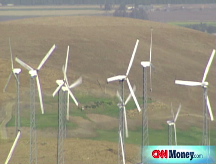Big Oil's money problem
Whether or not oil firms can generate huge earnings like they did this summer is debatable.
 |
| With prices down but costs still high, the days of record profits may be over. |
NEW YORK (CNNMoney.com) -- The days of oil companies shattering profit records are likely gone, at least for now.
As crude prices climbed higher and higher over the last few years, oil companies posted profits at previously record levels.
Exxon Mobil, the world's largest publicly traded oil firm, made nearly $15 billion this summer, when oil touched nearly $150 a barrel - a record for any corporation. For 2007, the company made over $40 billion.
Exxon was hardly alone. The number two domestic oil company, Chevron, made over $18 billion in 2007. ConocoPhillips, number three, made over $5 billion.
Those massive earnings sparked outrage among motorists and politicians. But as oil prices tumble in the wake of a reeling economy - they're currently around $50 a barrel - some think Big Oil's earnings rampage is done.
"I'm afraid to say those [profit] numbers are history," said Robbert Van Batenburg, Head of Global Research at Louis Capital Markets, a Manhattan-based brokerage. "Demand is collapsing, and the industry is infested with overcapactity."
Others say record profits will bounce back as soon as the economy - and oil prices - return to growth mode. Still others believe oil prices will surpass $150, but believe that profits will lag as expenses for the oil companies mount.
Van Batenburg uses laws of basic supply and demand support his argument, and doesn't see oil prices coming back to their recent highs, at least not for the next five years.
On the supply side, he says OPEC - spurred to invest in new production during the last few years of high prices - will be bringing on another 2.5 million barrels a day over the next 12 months. And no mater what the cartel says, it will have a hard time controlling output with many member countries desperate for cash in the face of plummeting prices.
Supplies in countries outside OPEC are expected to increase another 2.5 million barrels a day, according to Van Battenburg.
He says Iraq - where the security situation has improved greatly over the last year - has huge potential.
"You can go into Kurdistan and pick up oil in a bucket," said Van Batenburg, referring to the northern region in Iraq. "It's coming right out of the ground, it's like the Rockefeller days."
On the demand side, the faltering economy has already taken a toll - it's the main reason prices have come down so much already - and few expect the situation to improve much before the end of 2009.
But even when the economy does bounce back, Van Batenburg says an Obama administration that's committed to conservation in the U.S. will go a long way toward keeping a lid on demand, and prices in check.
On the other side of this argument are those that think oil prices will rebound as soon as the economy recovers, which some say could be as soon as the middle of 2009.
Once the global economy is humming along again, oil prices will face the same circumstances that drove them up earlier this year - voracious demand, limited new supplies, and the discovery of commodities as an investment class.
"I have commodity prices going up in late 2009 and 2010," said Sheraz Mian, senior oil and gas analyst at Zacks Investment Research. "I do see the earnings getting back to the levels we've seen in the past."
There is a third view as well - that oil prices will return to record levels fairly shortly, but oil company profits won't follow.
That's because oil firms will have to spend an increasing amount of money bringing new, more expensive supplies to market as older, cheap-to-pump fields dry up.
It's estimated that Saudi Arabia can still pump crude from it's massive Ghawar oil field for a little over $1 a barrel, but when that field may run dry is anyone's guess.
Some new fields, like those in the deep water Gulf of Mexico, are expected to cost over $90 a barrel to produce.
Some new projects, like off Russia's Saklin Island and in the Caspian Sea, are already way over budget and behind schedule.
"We may be back up to $150 a barrel, but costs are up too," said Douglas Ober, head of the Baltimore-based investment fund Petroleum & Resources. "We may concievably never see these profitably levels again." ![]()



